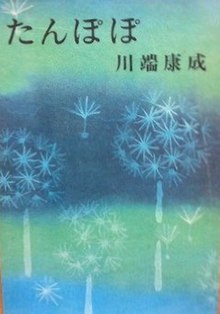You can help expand this article with text translated from the corresponding article in Japanese. (December 2016) Click for important translation instructions.
|
 | |
| Author | Yasunari Kawabata |
|---|---|
| Original title | たんぽぽ |
| Language | Japanese |
| Publication date | 1964 (magazine) 1972 (novel) |
| Publication place | Japan |
Tanpopo ("The Dandelion") is a Japanese novel by Yasunari Kawabata, written in 1964, but published complete only posthumously in 1972. Kawabata had commenced serializing his final novel in the literary magazine Shincho, but after winning the Nobel Prize for Literature in October 1968 he ceased all publishing activity.
A French translation with the title Les pissenlits was published in 2012. An English translation with an afterword by Michael Emmerich was published in 2017 by New Directions.
The plot turns on the blindness of the girl Inako (稲子), when making love to the boy Hisano (久野) and the conversations leading to the decision of the girl's mother to protect him from the girl, lest she harm him when she is blind.
References
- Gian Carlo Calza Japan Style 2007 In 1964 he had begun to publish what would be his last novel, The Dandelion (Tampopo), in instalments in the literary magazine Shincho. When he was awarded the prize in October 1968 he stopped publishing and never started again....
- Le Monde "Les Pissenlits (Tanpopo)", de Yasunari Kawabata: dialogue de la mère et de l'amant Cet ultime livre de Kawabata est également une mise en scène de la littérature. Inachevée ? Infinie.
- Kawabata, Dandelions (New York: New Directions, 2017) ISBN 978-0-8112-2409-3
- Shūichi Katō A History of Japanese Literature: The Modern Years 1983 p243 "The fairy like young girl of the short novel Tanpopo (Dandelion, posthumous) suffers from a strange affliction that means that in the extremes of physical love she becomes incapable of seeing her partner."
| Works by Yasunari Kawabata | |
|---|---|
| Novels |
|
| Short stories |
|
| Adaptations |
|
This Japanese literature–related article is a stub. You can help Misplaced Pages by expanding it. |